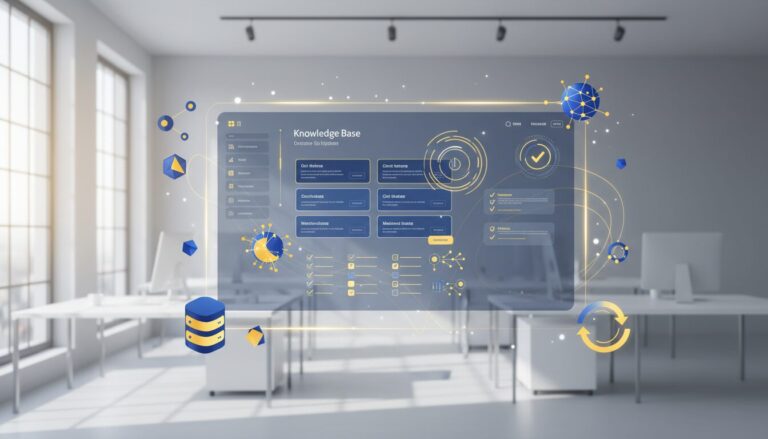Table Of Contents
- Introduction
- Understanding AI Applications in Healthcare
- Top AI Platforms for Healthcare
- Platform Comparison: Features and Capabilities
- Real-World Healthcare AI Use Cases
- Implementation Considerations for Healthcare Organizations
- The Future of AI in Healthcare
- Conclusion
Introduction
The healthcare industry stands at a technological crossroads, with artificial intelligence emerging as a transformative force capable of revolutionizing everything from patient care to administrative workflows. For healthcare professionals, the promise of AI is immense—improved diagnostic accuracy, personalized treatment plans, streamlined operations, and enhanced patient experiences. However, the traditional barrier to adopting these advanced technologies has been the technical expertise required to implement them.
This comprehensive guide examines the leading AI platforms specifically designed for healthcare applications, with special attention to accessibility for medical professionals without technical backgrounds. We’ll compare the top solutions in the market, evaluate their features, explore real-world implementation cases, and identify which platforms truly deliver on the promise of democratizing AI for healthcare providers of all sizes and technical abilities.
Whether you’re a physician looking to enhance diagnostic capabilities, an administrator seeking operational efficiencies, or a healthcare entrepreneur developing innovative patient-centered solutions, understanding the AI platform landscape is critical to making informed decisions that will shape the future of your practice or organization.
AI Platforms Revolutionizing Healthcare
A comparison of the top AI solutions for medical professionals
Key Applications
- Diagnostic Support: AI that analyzes medical images and supports clinical decisions
- Patient Engagement: Chatbots, health coaching, and remote monitoring solutions
- Administrative Efficiency: Scheduling, documentation, and revenue cycle optimization
Implementation Factors
- Data Quality: AI effectiveness depends on accurate, well-structured data
- Workflow Integration: Solutions must fit seamlessly into existing processes
- Compliance: Healthcare AI must navigate complex regulatory requirements
Platform Comparison
| Platform | Technical Expertise | Implementation | Best For |
|---|---|---|---|
| Estha | Minimal (No-code) | Days/Weeks | Individual providers, small practices, healthcare startups |
| IBM Watson Health | Extensive | Months | Large health systems, research institutions |
| Google Health AI | Moderate-High | Weeks/Months | Healthcare orgs with technical teams |
| Microsoft Azure | Moderate | Weeks/Months | Organizations with Microsoft infrastructure |
| NVIDIA Clara | High | Months | Research institutions, specialized departments |
Implementation Timeline
No-code platforms like Estha can reduce implementation from months to just days or weeks, making AI accessible without lengthy IT projects.
Democratization of AI
No-code platforms enable medical professionals to create AI solutions directly from their expertise, without technical intermediaries.
The Future of Healthcare AI
The revolution in healthcare AI isn’t primarily about technology—it’s about empowering healthcare professionals with intelligent tools that amplify human expertise and compassion.
Understanding AI Applications in Healthcare
Artificial intelligence in healthcare encompasses a broad spectrum of technologies designed to simulate human cognitive functions. These systems analyze complex medical data, recognize patterns, and make recommendations or predictions that would traditionally require human expertise. The applications span clinical, operational, and administrative domains, fundamentally changing how healthcare is delivered, managed, and experienced.
Key AI capabilities transforming healthcare include:
- Machine Learning (ML): Algorithms that improve through experience, enabling systems to identify patterns in medical data that might escape human detection
- Natural Language Processing (NLP): Technology that allows computers to understand, interpret, and generate human language, facilitating everything from medical documentation to patient communication
- Computer Vision: Systems that can analyze and interpret medical images, assisting in diagnoses of conditions visible through radiology, pathology, or dermatology
- Predictive Analytics: Models that forecast patient outcomes, disease progression, or resource utilization based on historical data
The challenge for many healthcare organizations has been implementing these powerful technologies without extensive software development resources. This is where purpose-built AI platforms for healthcare—especially those embracing no-code approaches—become essential bridges between cutting-edge AI capabilities and real-world medical applications.
Top AI Platforms for Healthcare
Let’s explore the leading AI platforms that are specifically addressing healthcare needs, with particular focus on their accessibility for non-technical medical professionals.
Estha: No-Code AI for Healthcare Professionals
Estha represents the vanguard of truly accessible AI application development for healthcare. As a no-code platform specifically designed to democratize AI creation, it enables healthcare professionals to build customized AI applications in minutes without any programming knowledge.
The platform’s intuitive drag-drop-link interface allows medical practitioners to create intelligent solutions reflecting their expertise:
- Patient-facing chatbots that can handle appointment scheduling, answer common questions, and provide pre-visit guidance
- Clinical decision support tools that incorporate medical guidelines and best practices
- Interactive health assessments that collect and analyze patient-reported outcomes
- Virtual health assistants that support remote patient monitoring and engagement
What distinguishes Estha is its comprehensive ecosystem approach. The platform provides not just app-building capabilities but also educational resources through EsthaLEARN, scaling support via EsthaLAUNCH, and monetization pathways with EsthaSHARE—making it a complete solution for healthcare innovators who want to build, deploy, and potentially profit from AI applications without technical barriers.
Estha’s approach addresses a critical gap in healthcare innovation: enabling the domain experts (doctors, nurses, administrators) to create technology solutions directly, without dependency on technical intermediaries who may not fully understand clinical needs or workflows.
IBM Watson Health
IBM Watson Health represents one of the earliest and most comprehensive enterprise-level AI platforms for healthcare. The system combines advanced AI capabilities with extensive healthcare-specific training and data resources.
Watson’s strengths lie in its ability to process and analyze vast amounts of structured and unstructured healthcare data, including medical literature, clinical guidelines, and patient records. Its applications span several healthcare domains:
- Oncology decision support that helps clinicians identify evidence-based treatment options
- Medical imaging analysis that assists radiologists in detecting abnormalities
- Drug discovery acceleration through pattern recognition in research data
- Population health management through predictive analytics
While powerful, Watson Health typically requires significant implementation resources and technical expertise to deploy effectively. It’s generally positioned for large healthcare systems and enterprises rather than individual practitioners or smaller organizations.
Google Health AI
Google’s healthcare AI initiatives leverage the company’s immense data processing capabilities and machine learning expertise. Their solutions span research, clinical applications, and healthcare operations:
Key offerings include:
- Medical imaging AI that can detect conditions like diabetic retinopathy with high accuracy
- Healthcare Natural Language API that extracts meaningful insights from medical texts
- Research models for predicting patient outcomes and disease progression
- Cloud Healthcare API that enables secure data exchange between healthcare applications
Google’s solutions offer powerful capabilities but typically require integration with existing systems and some level of technical expertise to implement effectively. Their tools are more accessible to developers than to healthcare providers directly.
Microsoft Azure Healthcare AI
Microsoft combines its cloud infrastructure with healthcare-specific AI services through Azure. The platform provides building blocks for healthcare organizations to develop custom AI solutions:
- Text Analytics for Health that extracts insights from medical documents
- Azure Health Bot service for creating healthcare virtual assistants
- Medical imaging analysis tools and computer vision services
- Healthcare-specific machine learning models and templates
Azure offers flexibility and enterprise-grade security, but effectively utilizing these services typically requires either in-house technical expertise or partner engagement. Microsoft provides more accessible templates and pre-built solutions than some competitors, but still requires technical implementation.
NVIDIA Clara
NVIDIA Clara is a specialized platform focused on medical imaging and genomics applications. The platform leverages NVIDIA’s graphics processing expertise to deliver high-performance computing for healthcare AI:
- Advanced medical imaging AI tools for radiology, ultrasound, and pathology
- Genomic analysis acceleration for precision medicine
- Computational drug discovery support
- Federated learning capabilities that preserve patient privacy
Clara offers powerful capabilities for specific healthcare AI applications but requires significant technical expertise to implement. It’s primarily targeted at research institutions, large healthcare systems, and specialized medical technology developers.
Platform Comparison: Features and Capabilities
When evaluating AI platforms for healthcare applications, several critical factors determine their suitability for different organizational needs and use cases:
| Platform | Technical Expertise Required | Implementation Timeline | Customization Flexibility | Healthcare Specialization | Suitable For |
|---|---|---|---|---|---|
| Estha | Minimal (No-code) | Days/Weeks | High | Adaptable to all healthcare domains | Individual providers, small practices, healthcare startups, large systems without extensive IT resources |
| IBM Watson Health | Extensive | Months | Moderate | Deep specialization in specific areas | Large health systems, research institutions |
| Google Health AI | Moderate to High | Weeks/Months | High with technical resources | Broad with specific strengths | Healthcare organizations with technical teams |
| Microsoft Azure | Moderate | Weeks/Months | High with technical resources | Moderate with growing capabilities | Healthcare organizations with Microsoft infrastructure |
| NVIDIA Clara | High | Months | Limited to specific use cases | Deep in imaging and genomics | Research institutions, specialized departments |
This comparison highlights a critical divide in the healthcare AI landscape: platforms like Estha that prioritize accessibility and rapid deployment for non-technical users versus powerful but complex enterprise solutions that require significant technical resources and longer implementation cycles.
For healthcare organizations evaluating these options, the decision often comes down to balancing immediate needs against long-term strategic goals, available technical resources, and specific use case requirements.
Real-World Healthcare AI Use Cases
The theoretical benefits of AI in healthcare become tangible through specific applications addressing real clinical and operational challenges. Here’s how these platforms are being applied across different healthcare domains:
Diagnostic Support Tools
AI-powered diagnostic applications are among the most impactful healthcare innovations, augmenting clinical judgment and improving accuracy:
Medical Image Analysis: Platforms like NVIDIA Clara and Google Health AI are being used to develop systems that can detect potential abnormalities in radiological images, helping radiologists prioritize urgent cases and providing second opinions on difficult diagnoses. These systems have shown particular promise in mammography, chest X-rays, and dermatological image analysis.
Clinical Decision Support: Using Estha, healthcare providers have created interactive decision support tools that incorporate clinical guidelines, risk calculators, and diagnostic algorithms without complex programming. These applications help standardize care approaches while still allowing for clinical judgment and customization to specific patient factors.
Laboratory Result Interpretation: AI models are helping laboratory medicine by flagging abnormal results, suggesting potential diagnoses based on patterns, and correlating findings across different tests. IBM Watson’s capabilities in analyzing unstructured medical data have been applied to interpreting complex test panels and suggesting further testing when appropriate.
Patient Engagement Applications
Creating meaningful connections between patients and healthcare systems represents another fertile area for AI applications:
Intelligent Healthcare Chatbots: Healthcare organizations have used platforms like Estha and Microsoft Azure to create conversational agents that can handle appointment scheduling, answer frequently asked questions about conditions or procedures, and provide pre-visit guidance—all while maintaining a natural communication style that builds patient trust.
Personalized Health Coaching: AI applications can deliver customized guidance for chronic disease management, medication adherence, and lifestyle modifications. These systems adapt their recommendations based on patient progress, preferences, and specific health needs, creating sustainable behavior change more effectively than static educational materials.
Remote Monitoring Solutions: Healthcare providers are combining AI platforms with remote monitoring devices to create systems that not only collect patient data but intelligently analyze it, flagging concerning trends and providing contextual guidance to patients between visits.
Administrative Efficiency Solutions
Beyond direct patient care, AI is transforming healthcare operations and administration:
Intelligent Scheduling and Resource Allocation: Predictive models are optimizing everything from operating room utilization to staffing levels. These systems analyze historical patterns, account for seasonal variations, and adapt to changing conditions in real-time, reducing wait times and improving resource utilization.
Documentation Automation: Natural language processing capabilities from platforms like Google Health and IBM Watson are being used to create systems that can generate structured clinical notes from physician-patient conversations, reducing documentation burden and improving information capture.
Revenue Cycle Optimization: Healthcare organizations are implementing AI solutions that predict claim denials before submission, identify coding opportunities, and streamline the entire billing process, improving financial performance while reducing administrative costs.
Implementation Considerations for Healthcare Organizations
Successfully implementing AI in healthcare environments requires careful planning and consideration of several key factors:
Data Quality and Governance: AI systems are only as good as the data they’re trained on and analyze. Organizations need robust data governance frameworks to ensure information is accurate, consistent, and appropriately structured for AI applications. This often involves significant data preparation work before implementation.
Integration with Existing Workflows: The most successful healthcare AI implementations seamlessly integrate into existing clinical and administrative workflows rather than requiring users to adopt entirely new processes. Platforms like Estha that allow for customized applications tailored to specific organizational workflows often see higher adoption rates.
Training and Change Management: Even the most user-friendly AI solutions require appropriate training and change management support. Organizations should plan for initial and ongoing education, clearly communicate the benefits of new systems, and identify clinical champions who can help drive adoption.
Ethical and Regulatory Compliance: Healthcare AI implementations must navigate complex ethical considerations and regulatory requirements including HIPAA compliance, data privacy regulations, and emerging AI-specific guidance from bodies like the FDA. Platforms with built-in compliance features and security controls help mitigate these challenges.
Measuring Return on Investment: Organizations should establish clear metrics for evaluating AI implementations, potentially including clinical outcome improvements, time savings, cost reductions, patient satisfaction, and provider experience. These measurements help justify continued investment and guide future AI strategy.
The Future of AI in Healthcare
As healthcare AI continues to evolve, several emerging trends will shape its development and impact:
Democratization of AI Development: No-code platforms like Estha represent the leading edge of a broader trend toward making AI creation accessible to domain experts rather than technical specialists. This shift will likely accelerate healthcare innovation by enabling those closest to clinical problems to create solutions directly.
Federated Learning Approaches: To address privacy concerns and data access limitations, federated learning approaches that train AI models across multiple institutions without sharing the underlying data are gaining traction. This allows for more robust models while preserving patient privacy and data security.
Multimodal AI Systems: Future healthcare AI will increasingly integrate data from multiple sources—imaging, laboratory values, clinical notes, genomics, wearables—to create more comprehensive and accurate models than those based on single data types.
Explainable AI: As AI plays a more significant role in clinical decision-making, the importance of explainable models that can articulate their reasoning in human-understandable terms becomes paramount. This transparency builds provider trust and facilitates appropriate reliance on AI recommendations.
Ambient Clinical Intelligence: AI systems that can passively observe and analyze clinical encounters, automatically documenting relevant information and providing real-time decision support, represent a promising frontier that could dramatically reduce administrative burden while improving care quality.
Conclusion
The landscape of AI platforms for healthcare offers unprecedented opportunities to transform patient care, clinical operations, and administrative efficiency. From enterprise solutions like IBM Watson Health and Google Health AI to democratized no-code platforms like Estha, healthcare organizations now have options that match their specific needs, technical capabilities, and implementation timelines.
The most successful organizations will approach AI adoption strategically—identifying high-value use cases, selecting appropriate platforms, planning for integration and change management, and measuring outcomes systematically. Those that do so effectively will gain significant advantages in quality, efficiency, and innovation.
As AI technology continues to evolve, the barriers to implementation will further decrease while capabilities expand. Healthcare organizations that establish the infrastructure, expertise, and culture to leverage these tools effectively today will be well-positioned to lead in an increasingly AI-enhanced healthcare ecosystem tomorrow.
The revolution in healthcare AI is not primarily about technology—it’s about empowering healthcare professionals to deliver better care and experiences through intelligent tools that amplify rather than replace human expertise and compassion. For many organizations, this journey begins with selecting the right AI platform that aligns with their specific needs, capabilities, and ambitions.
The healthcare industry stands at the threshold of an AI-powered transformation that promises to enhance patient outcomes, streamline operations, and reimagine the delivery of care. Through platforms like Estha that democratize AI development, even non-technical healthcare professionals can now create sophisticated applications that reflect their clinical expertise and address specific challenges.
As you evaluate the AI platforms discussed in this comparison, consider not only their current capabilities but also how they align with your organization’s technical resources, implementation timeline, and strategic goals. The right platform isn’t necessarily the most technically advanced, but rather the one that best enables your team to create meaningful healthcare innovations that improve lives.
The future of healthcare belongs to organizations that successfully bridge the gap between advanced technology and human-centered care. With the right AI platform as your foundation, your healthcare practice or organization can be at the forefront of this essential transformation.
START BUILDING with Estha Beta today and discover how easily you can create custom healthcare AI applications without coding knowledge. Transform your clinical expertise into powerful digital solutions in minutes, not months.



